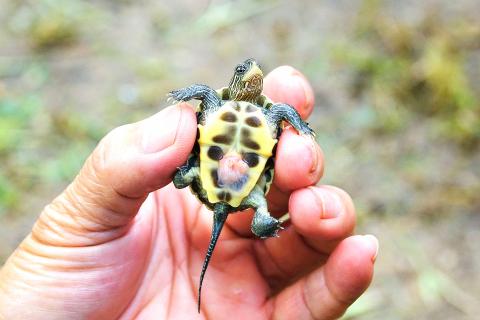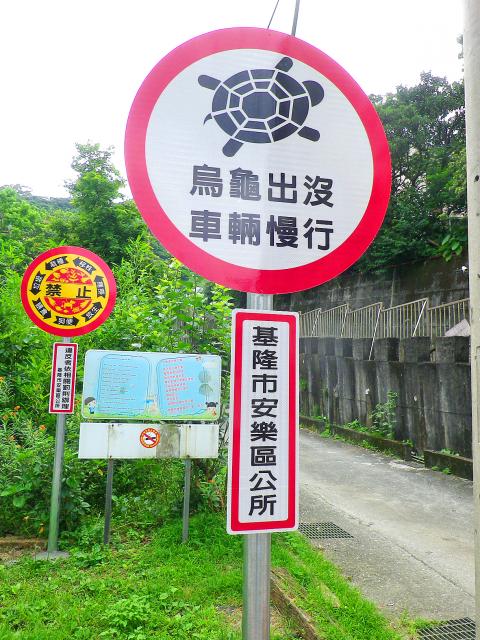Two eggs from a clutch laid by a golden thread turtle, which is endemic to the Neiliao Wetlands (內寮濕地), hatched on Saturday, a sign that conservation measures to boost the species’ population is starting to bear fruit, volunteers in the area said.
April last year was a sad time for conservation efforts, as a female turtle seeking a suitable place to lay her legs was run over by traffic, Keelung Wild Birds Society president Shen Chin-feng (沈錦豐) said.
The accident prompted society volunteers to place traffic signs near the wetlands’ entrance to warn drivers of turtles crossing the road, a first in the nation.

Photo courtesy of Keelung Wild Birds Society president Shen Chin-feng
The baby turtles that hatched on Saturday were taken by society volunteers for observation, and would be released back to the wild when deemed suitable, Shen said.
The society had thought that the clutch of eggs were unfertilized, because the last time the volunteers had checked, all the turtles in the wetlands seemed to be female, Shen said.
We are glad to be proven wrong, Shen and other volunteers said, adding that the society has redoubled its efforts to care for the turtles and drive off wild dogs and other animals.

Photo: Lu Hsien-shou, Taipei Times
While the turtles are found in higher numbers in Taiwan than elsewhere and are not considered endangered or protected under the law, they are listed as an endangered species by the International Union for Conservation of Nature, Shen said.
The local population of golden thread turtles has gradually declined due to the increasing population of red-eared sliders — a species that has invaded many areas after being released by pet owners.
The number of golden thread turtles might drop further if conservation measures are not taken, Shen said.
The group urged drivers in Keelung’s Anle District (安樂) to be mindful of the traffic signs and slow down for the turtles, which might be roaming about the streets.

A strong continental cold air mass is to bring pollutants to Taiwan from tomorrow, the Ministry of Environment said today, as it issued an “orange” air quality alert for most of the country. All of Taiwan except for Hualien and Taitung counties is to be under an “orange” air quality alert tomorrow, indicating air quality that is unhealthy for sensitive groups. In China, areas from Shandong to Shanghai have been enveloped in haze since Saturday, the ministry said in a news release. Yesterday, hourly concentrations of PM2.5 in these areas ranged from 65 to 160 micrograms per cubic meter (mg/m³), and pollutants were

Taiwan’s armed forces have established response protocols for a wide range of sudden contingencies, including the “Wan Chun Plan” to protect the head of state, the Ministry of Defense (MND) said today. After US President Donald Trump on Saturday launched a series of airstrikes in Venezuela and kidnapped Venezuelan President Nicolas Maduro, concerns have been raised as to whether China would launch a similar “decapitation strike” on Taiwan. The armed forces regularly coordinate with relevant agencies and practice drills to ensure preparedness for a wide range of scenarios, Vice Minister of National Defense Hsu Szu-chien (徐斯儉) told reporters before a

EVA Airways on Saturday said that it had suspended a pilot and opened an investigation after he allegedly lost his temper and punched the first officer several times as their plane was taxiing before takeoff at Los Angeles International Airport. According to a report published on Thursday by The Reporter, the incident occurred after the flight’s Malaysian first officer tried to warn the Taiwanese pilot, surnamed Wen (文), that he was taxiing faster than the speed limit of 30 knots (55.6kph). After alerting the pilot several times without response, the first officer manually applied the brakes in accordance with standard operating

NOT AN OPENING: Trump’s violation of international law does not affect China’s consideration in attacking Taiwan; Beijing lacks capability, not precedent, an official said Taiwanese officials see the US’ capture of the president of Venezuela as a powerful deterrent to Beijing’s aggression and a timely reminder of the US’ ability to defeat militaries equipped with Chinese-made weapons. The strikes that toppled Venezuelan President Nicolas Maduro signaled to authoritarian leaders, including Chinese President Xi Jinping (習近平), US President Donald Trump’s willingness to use military might for international affairs core to US interests, one senior official in Taipei’s security circle said. That reassured Taiwan, the person said. Taipei has also dismissed the idea that Trump’s apparent violation of international law could embolden Beijing, said the official, who was not